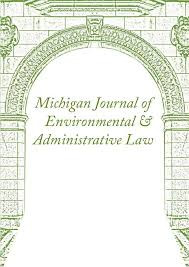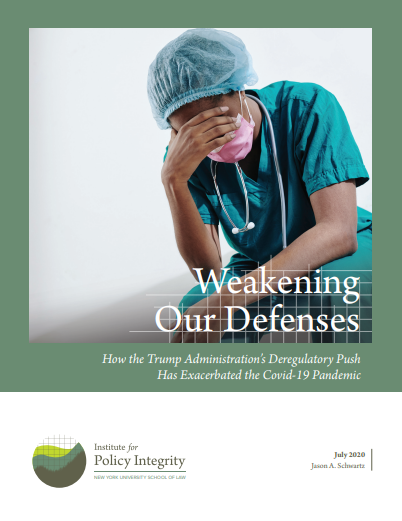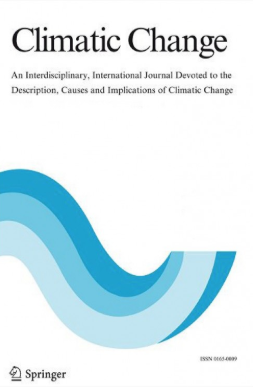-

Implementing NEPA in the Age of Climate Change
Published in the Michigan Journal of Environmental & Administrative Law
Under the National Environmental Policy Act, agencies must consider the environmental impacts of major federal actions before they can move forward. But agencies frequently downplay or ignore the climate change impacts of their projects in NEPA analyses, citing a slew of technical difficulties and uncertainties. This article, published in the Michigan Journal of Environmental & Administrative Law, aims to highlight best practices so that agency offices can learn from one another, fulfill NEPA’s mandate, and begin to provide leadership in the fight against climate change.
-

Markets, Externalities, and the Federal Power Act: The Federal Energy Regulatory Commission’s Authority to Price Carbon Emissions
Article revised for the Environmental Law Reporter
This article, excerpted from Davis Noll and Unel’s article in the NYU Environmental Law Journal, provides a comprehensive economic framework to show that addressing the CO2 externality through a carbon price falls within FERC’s authority to ensure an efficient market.
-
Comments to New Jersey on Cost Test Straw Proposal
The New Jersey Board of Public Utilities (BPU) asked for comments on its straw proposal for the benefit-cost test that BPU would employ pursuant to the 2018 Clean Energy Act, which requires energy efficiency and peak demand reduction programs to satisfy a benefit-cost test. We submitted comments encouraging BPU to include avoided greenhouse gas emissions among the non-energy benefits it credits to energy efficiency and peak demand reduction projects. We also suggest that BPU adopt a tool and methodology for assessing the benefit of avoided local air pollutants that is more sensitive than those identified in the proposal.
-
Comments on Test Procedures for Vehicle Emissions
The Environmental Protection Agency (EPA) proposed a rule adjusting the test procedures to calculate greenhouse gas emissions and fuel economy rates for the GHG and CAFE programs and the Fuel Economy and Environment Label upon adoption of Tier 3 certification test fuel. We submitted comments that encourage EPA to finalize the proposal, and explain that EPA would be required to provide a new proposal, rationale, and analysis if it chooses to forgo the GHG emissions test adustment.
-
Comments to EPA on Proposal for Cost-Benefit Analysis and the Clean Air Act
We submitted joint comments to EPA and the chartered Science Advisory Board noting that the proposal is unnecessary and explaining how it breaks from best practices for cost-benefit analysis of regulations in several significant ways.
-
Amicus Brief in D.C. Circuit on Tennessee Pipeline Extension
If constructed, the Tennessee pipeline extension and related projects would be responsible for substantial greenhouse gas emissions. We submitted an amicus brief to the U.S. Court of Appeals for the D.C. Circuit that explains how FERC’s failure to quantify the project’s emissions and monetize climate damages using Social Cost of Carbon estimates is arbitrary.
-
New Mexico PRC Adopts Plan to Replace San Juan Coal Plant with Renewables Portfolio
In 2022, New Mexico’s largest utility company will retire the San Juan Generating Station, a coal-burning power plant that has operated since 1973. In light of the decision, the state’s Public Regulatory Commission (PRC) has adopted a plan to replace the plant’s power output with 100 percent renewable energy and battery storage. The plan is a significant victory for the community groups and environmental advocates that have pushed to expedite the clean energy transition, and our efforts helped pave the way for this decision.
-
Comments to Virginia on Developing an Energy Storage Rule
The Virginia State Corporation Commission asked for input in advance of developing a rule for energy storage deployment. Our comments note that energy storage deployment can increase emissions from the electricity sector, even if those deployments also facilitate the integration of variable renewable resources. We urge the Commission, under the Virginia Clean Economy Act, to adopt a rule ensuring that energy storage resources are deployed and operated in ways that reduce net emissions.
-
Weakening Our Defenses
How the Trump Administration’s Deregulatory Push Has Exacerbated the Covid-19 Pandemic
The failure of the federal government to adequately safeguard the health, environment, and economy of the United States with efficient regulatory protections is not a new phenomenon. For over three years now, the Trump administration has systematically delayed, undermined, and erased key regulations that protect our health, our environment, our workplaces, our living conditions, and our economy. The steady erosion of regulatory safeguards has severely compromised our baseline defenses against Covid-19.
-
Wisdom of the Experts
Using Survey Responses to Address Positive and Normative Uncertainties in Climate-Economic Models
The social cost of carbon (SCC) and the climate-economic models underlying this prominent US climate policy instrument are heavily affected by modeler opinion and therefore may not reflect the views of most climate economists. To test whether differences exist, we recalibrate key uncertain model parameters using formal expert elicitation: a multi-question online survey of individuals who have published scholarship on the economics of climate change. Read the article, published in Climatic Change.
Viewing recent projects in Climate and Energy Policy








